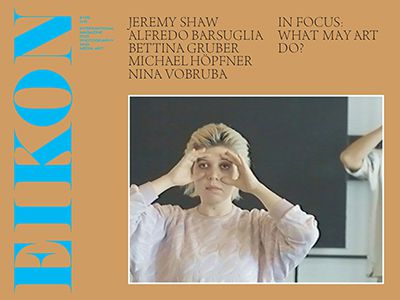
EIKON #109

Artists | Alfredo Barsuglia | Bettina Gruber | Michael Höpfner | Jeremy Shaw | Nina Vobruba |
Thomas Ballhausen | Simon Bowcock | Katharina Brandl | Pia Draskovits | June Drevet | Margit Emesz | Lucas Gehrmann | Synne Genzmer | Maximilian Geymüller | Ruth Horak | David Komary | Carlos Kong | Peter Kunitzky | Fiona Liewehr | Maren Lübke-Tidow | Danièle Perrier | Maria Rennhofer | Ulrich Tragatschnig | Barbara von Flüe | Margit Zuckriegl
Languages | German / English
Dimensions | 280 x 210 mm
ISBN | 978-3-904083-02-7
104 pages
Price: € 15,00 (incl. 10% VAT)
Online Order >>>Content
PORTFOLIO
Alfredo Barsuglia | Fiona Liewehr
Bettina Gruber | Barbara von Flüe
Jeremy Shaw | Carlos Kong
Michael Höpfner | David Komary
Nina Vobruba | Synne Genzmer
A WORK IN PROFILE
Rudi Rapf | Ruth Horak
ARTS & STUDIES
radio | Maximiliam Geymüller
IN FOCUS: WHAT MAY ART DO?
Art, Populism and Criticism | Danièle Perrier
FORUM
Provocation, Poesy, Humor—Feminist Avantgarde. Made in Austria
EXHIBITIONS
Dora Maar | Simon Bowcock
Family Matters | Pia Draskovits
Love, Ren Hang | Peter Kunitzky
Laughing. Antonia Baehr, Iman Issa, Stefan Klampfer, Sophia Mairer, Roee Rosen | Margit Zuckriegl
This is not land art | Lucas Gehrmann
Circular Flow. On the Economics of Inequality | Katharina Brandl
Meta Grgurevič. Impossible Machines | Ulrich Tragatschnig
SCHEDULE
with Andreas Müller-Pohle
COLLECTOR‘S EDITION
Karin Fisslthaler—I'll Be Your Mirror
PUBLICATIONS
After The Crisis. Contemporary States Of Photography | Thomas Ballhausen
Malte Zander. Languor | June Drevet
Tina Lechner. Susan Told Me | Peter Kunitzky
Jan Groover, Photographer. Laboratory Of Forms | Maren Lübke-Tidow
Florian Schwarz. A Handful Of Dust | Margit Emesz
Editorial
Ever since postmodernism emerged and reinforced doubts about the existence of a single, absolute truth, the concept of authenticity has fallen from grace. To this day, the loss of this implicit understanding of one truth permeates all areas of life, which is noticeable in an ever-increasing indifference to authorship and copyright—an attitude of “What matter who’s speaking?,” as Michel Foucault succinctly put it as early as 1974 (Michel Foucault, “What is an Author?” in Language, Countermemory, Practice. Selected Essays and Interviews by Michel Foucault, ed. Donald F. Bouchard. New York, N.Y.: Cornell University Press , 1980, 115.). No wonder, then, that the present digital oversaturation resulting from the unfiltered pluralism of an “anything goes” mentality (the communication style inherent in this technology is full of acronyms, emojis, photos, and videoclips ceaselessly courting our attention with flashy colors, animated as GIFs, or with added sound) has reawakened our human desire for something simple and straightforward—a core message, so to speak. Against the background of this multimedia form of interpersonal exchange it is consequently not very surprising that populist tendencies—concise, easily understandable statements instead of sophisticated wording—are once again on the ascent, preferably uttered by a strong leader whose competencies often (seem to) lie only in successfully conveying plain messages to the addressee.
The current desire for simplicity also doesn’t stop at the art world’s gate, as Danièle Perrier points out in this issue’s “In Focus,” entitled “What May Art Do?” By adding to and honing arguments presented at the 52nd International AICA Congress on the subject of “Art Criticism in the Age of Populisms and Nationalisms,” the author shows that even actions that originally sprang from political correctness might actually overshoot the target and must therefore be critically examined. In any case, Perrier’s remarks should encourage us to engage in a more sophisticated investigation of what is currently happening in the art world (and elsewhere)—which, of course, in turn means going against the trends of our fast-moving times by not offering society quick, simple solutions. Instead, we ought to call for broader, more in-depth, and perhaps sustained discourse.
The signs of the times are geared toward change. The year 2020 marks the beginning of a new decade—not only according to the Gregorian calendar: EIKON is also entering a new era this spring, an era of new proportions for our institution, as on March 10 we open the EIKON Schauraum, a 25-square-meter exhibition and discussion forum in the heart of MuseumsQuartier Vienna. The Schauraum will be staffed by EIKON two days a week and can be viewed twenty-four hours a day, even after the opening hours. Solo and group exhibitions with artists presented in the print issues are already scheduled for the first year, along with artist talks and panel discussions. This way, we hope to make our program accessible to an even wider audience. We look forward to a personal exchange with our visitors and to this new challenge, and we thank everyone who has supported us along the way: the Federal Ministry of Art, Culture, Civil Service and Sport; the City of Vienna; MuseumsQuartier Vienna and Q21, who are also on the premises. Cordial thanks also go to the team of BWM Architekten, whose minimalist adaptations (perfectly suited to the space) have created the ideal conditions for future exhibitions, presentations, talks, and panel discussions.
Nela Eggenberger
for EIKON, February 2020



 more
more Editorial
Editorial
